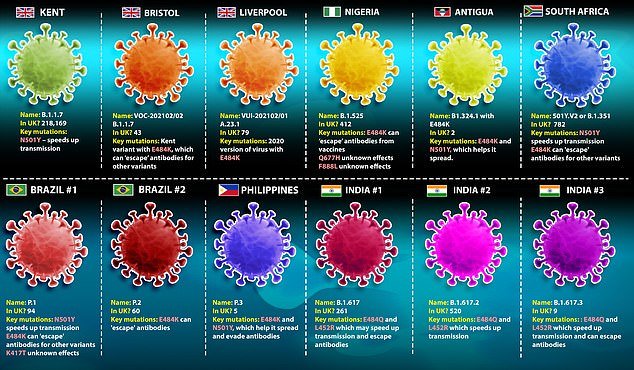Matt Hancock warns rise of new Covid variants poses ‘biggest risk’ to ending lockdown on June 21 – but says there is NO evidence vaccines don’t work against Indian and other troubling strains spreading in Britain
- Cases of the Indian variant – B.1.617.2 – in Britain have risen tenfold in a month
- PHE has classed it as ‘variant of concern’ but no evidence jabs won’t work on it
- Ministers plan to drop social distancing curbs on June 21 in final step of roadmap
A new coronavirus variant that bypasses vaccines would pose the ‘biggest risk’ to lockdown-ending plans next month, Matt Hancock warned today.
The health secretary said the only thing that would prevent Britain from returning to normal on June 21 would be the emergence of a mutant strain that makes vaccinated people severely ill.
There are growing fears about the Indian variant currently spreading in the UK after the Government’s experts said it could be more transmissible than the dominant Kent strain.
Cases of the B.1.617.2 variant – that has triggered a raging second wave in India – have risen tenfold in Britain in a month and make up half of new infections in London.
But Mr Hancock suggested it would not threaten Britain’s lockdown-easing hopes because it was not capable of getting around immunisation.
Mr Hancock told BBC Breakfast: ‘There is no doubt that a new variant is the biggest risk. We have this variant that was first seen in India – the so-called Indian variant – we have seen that grow.
‘We are putting a lot of resources into tackling it to make sure everybody who gets that particular variant gets extra support and intervention to make sure that it isn’t passed on.
‘However, there is also, thankfully, no evidence that the vaccine doesn’t work against it.’
His comments were echoed by a prominent SAGE adviser who said the country could return to pre-pandemic normal by the end of the year so long as the country keeps out ‘nasty variants’.
Public Health England has divided the Indian variant into three sub-types. Type 1 and Type 3 both have a mutation called E484Q but Type 2 is missing this, despite still clearly being a descendant of the original Indian strain. Type 1 and 3 have a slightly different set of mutations. The graphic shows all the different variants that have been spotted in Britain

Boris Johnson last night announced a major loosening of lockdown rules for next Monday
Public Health England last week branded the Indian strain a ‘variant of concern’ and the World Health Organization last night upgraded it to its highest risk category.
Mr Hancock echoed concerns raised by England’s chief medical officer Chris Whitty last night.
Professor Whitty told a Downing Street press conference that the Indian variant could replace the Kent strain because it is so infectious.
He said: ‘What we know with all the variants is that things can come out of a blue sky — you’re not expecting it and then something happens.
‘That is what happened with B.1.1.7 (which is commonly called the Kent variant and is currently dominant in Britain) and that has happened to India with this variant as well.
‘I think our view is that this is a highly transmissible variant, at least as transmissible as the B.1.1.7 variant. It is possible it is more transmissible but we’ll have to see.’ Data suggests the Kent variant is about 50 per cent more infectious than the original coronavirus type.
He added: ‘At this point in time, our view is that it is less likely to be able to escape vaccination than some of the other variants, particularly the South African one. But the data are not properly in there, so I think we need to be cautious until we’ve seen clear data that gives us an answer one way or the other.’
It came just an hour after it was revealed that England had recorded zero Covid deaths for the first time since July, despite growing fears about the Indian variant. Britain’s outbreak overall remains flat, with another four fatalities and 2,357 cases posted today.
In a report last week PHE said B.1.617.2 ‘may have replaced B.1.1.7 to some extent’. Testing figures suggest that only 50.2 per cent of all positive cases in London were caused by the Kent variant in late April, down from over 90 per cent in March.
The other 49.8 per cent were caused by other strains of the virus. The most common one was the Indian variant (B.1.617). Data showed it made up at least 37.5 per cent of confirmed cases but the exact proportion is unknown because not all samples have been thoroughly analysed.
Professor Christina Pagel, a mathematician at University College London and member of Independent SAGE, said the other half was ‘potentially all’ the Indian variant. Despite the rapid spread, cases in London remain stable.
The variant has been divided into three types, with type .2 the most common, but only one in five cases of this in London were among returning travellers, showing it is spreading within the city.
In the North West only 16 per cent of people infected with the variant had been out of the country recently, but most other regions saw a third to a half of their cases linked directly to international travel, likely to India.
